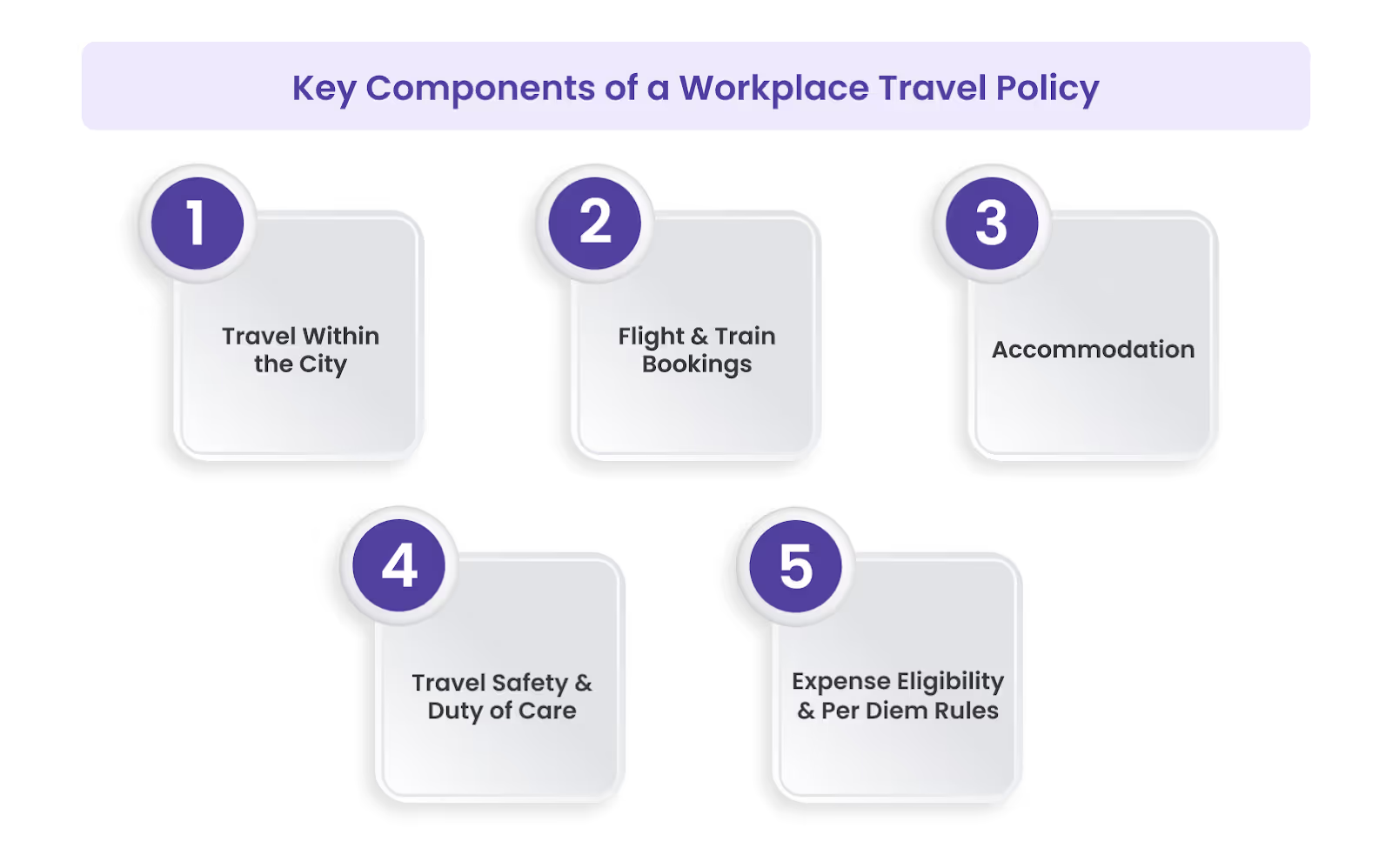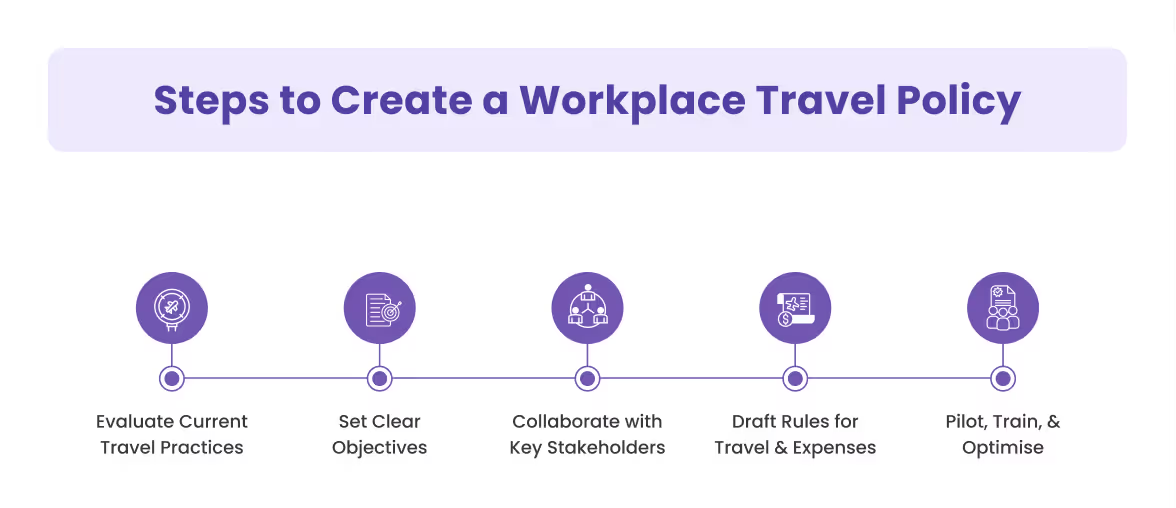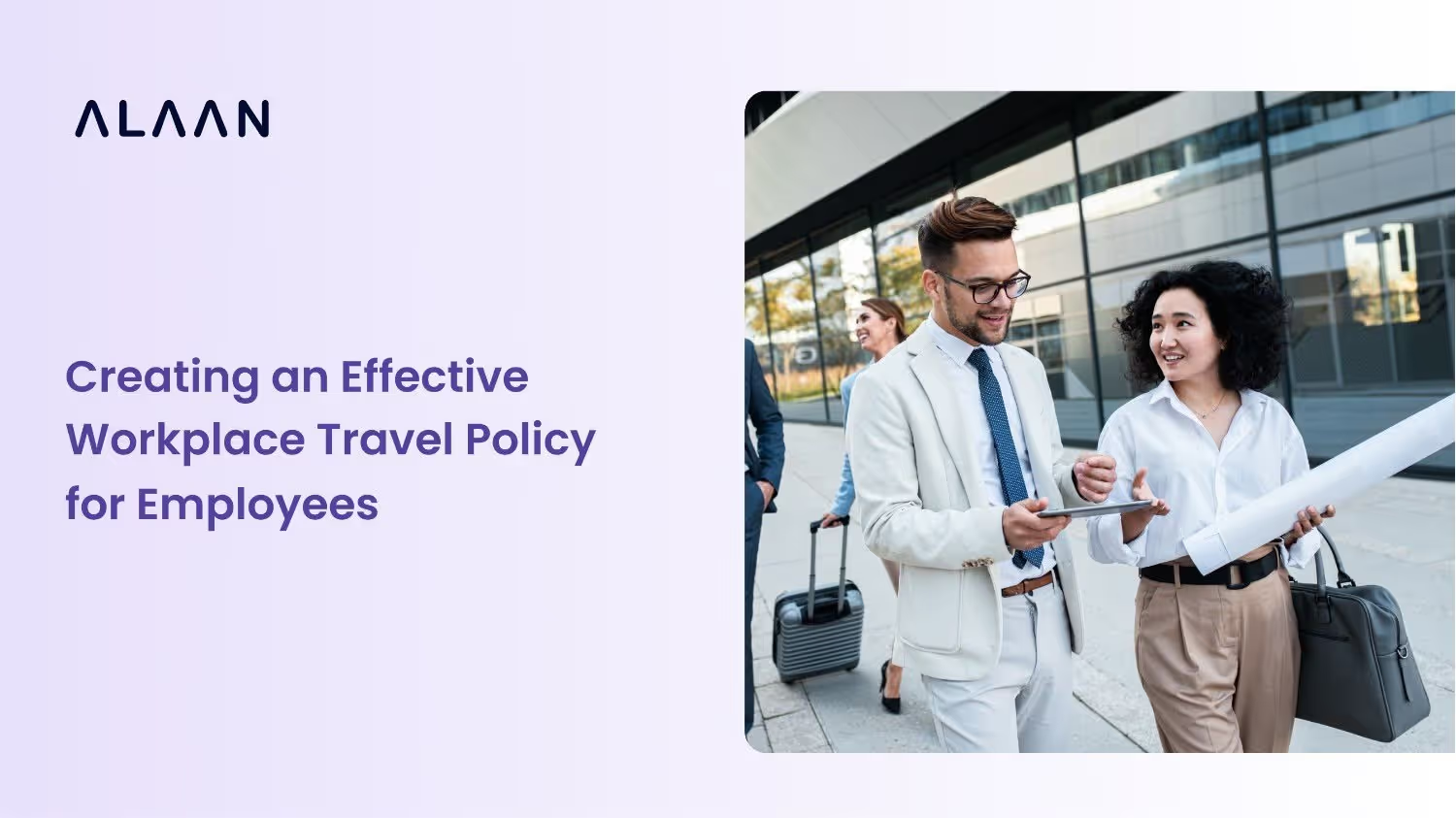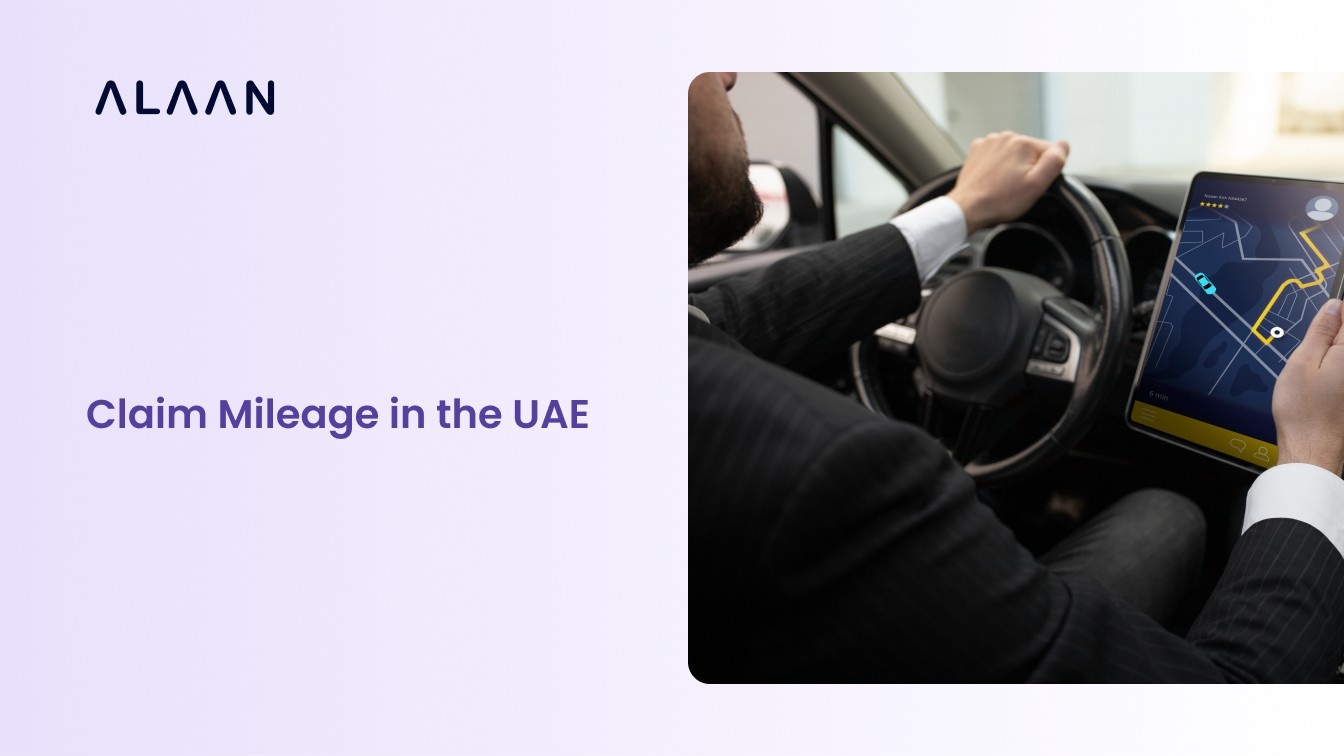Business travel is on the rise again across the Middle East. Industry forecasts indicate corporate travel spending in the region will grow by 6.1% in 2025, reflecting a strong return to in‑person meetings, client visits, and industry events.
Yet, many organisations still manage travel without a clear structure. Without a formal workplace travel policy, costs can spiral, employees are left uncertain about what expenses are allowed, and finance teams face last‑minute reimbursement headaches.
A well‑defined policy does more than control costs. It protects employees, ensures regulatory compliance, and streamlines expense management, turning travel from a potential liability into a well‑managed, predictable process.
In this blog, we break down how to create an effective workplace travel policy that controls costs, safeguards employees, and ensures compliance.
Key Takeaways:
- Control travel costs with clear booking rules, spend limits, and preferred vendors
- Protect employees with duty‑of‑care measures and emergency protocols
- Simplify approvals and reimbursements using corporate cards and per diems
- Automate policy enforcement and VAT‑ready tracking with Alaan
What Is a Workplace Travel Policy?
A workplace travel policy is a set of guidelines that tells employees how to plan, book, and claim work‑related travel. It removes confusion by clarifying what trips are allowed, how bookings should be approved, which expenses are reimbursable, and how the company supports employee safety during travel.
By putting these rules in place, businesses gain better cost control, ensure compliance, and give employees a clear, predictable travel process.
Also Read: Simplify Travel Expense Management with Corporate Cards
Why Is a Workplace Travel Policy Important?
A workplace travel policy is a strategic tool that helps companies save money, protect employees, and simplify financial management.
- Cost Control: A clear policy prevents unnecessary spending by setting limits on flights, hotels, and daily allowances. It also allows finance teams to forecast and manage travel budgets more accurately.
- Eliminates Confusion: Employees know exactly what expenses are eligible, how to seek approvals, and which costs will not be reimbursed. This clarity reduces back‑and‑forth with finance teams.
- Improves Compliance: Documented processes ensure travel spending adheres to company rules and regulatory requirements, including VAT documentation for eligible expenses.
- Reduces Risk of Policy Violations and Fraud: Structured approval workflows and pre‑defined rules help prevent unauthorised bookings, duplicate claims, and inflated reimbursements.
- Enhances Employee Experience: Employees can travel with confidence, knowing the company supports them with clear guidelines, faster reimbursements, and defined duty‑of‑care measures during trips.
When implemented well, a workplace travel policy turns travel from an unpredictable expense into a managed, optimised, and safe part of business operations.
Also Read: 2025 Guide to Managing Corporate Travel
Key Components of a Workplace Travel Policy

A strong travel policy gives employees a clear guide for every stage of business travel, from short local trips to multi‑day international assignments. These are the essential components that every company should consider:
Travel Within the City
Local travel for meetings or site visits should follow clear rules. Companies can define approved transport options such as taxis, ride‑hailing apps, or company cars.
Mileage reimbursement, parking fees, and toll expenses should also be addressed to avoid confusion and ensure accurate cost tracking.
Flight and Train Bookings
A policy should outline which travel classes are permitted, how far in advance tickets should be booked, and when exceptions can be made.
Clear booking and approval workflows help companies save on last‑minute fares while keeping travel comfortable and safe for employees.
Accommodation
Define hotel booking procedures and nightly budget limits to prevent overspending. Preferred hotel chains or negotiated rates can be mentioned to control costs.
The policy should also clarify which services, such as breakfast or Wi‑Fi, are reimbursable and which are considered personal.
Travel Safety and Duty of Care
Safety is a critical element of any travel policy. Companies should provide emergency contacts, travel insurance details, and guidelines for handling medical or security incidents.
Duty‑of‑care measures reassure employees that the organisation supports them throughout their trip.
Expense Eligibility and Per Diem Rules
Outline exactly which expenses qualify for reimbursement and set clear per diem rates for meals and incidentals.
This avoids disputes, simplifies approvals, and helps finance teams predict and manage travel budgets more accurately.
When these components are clearly defined, employees can travel with confidence and finance teams can manage costs without friction. Now, let's look at how to create a workplace travel policy that actually works for both employees and the organisation.
How to Create a Workplace Travel Policy?

Building an effective workplace travel policy requires clarity, collaboration, and the right tools. A well-crafted policy balances employee convenience, safety, and cost control. Here's a step‑by‑step approach:
1. Evaluate Current Travel Practices
Start by reviewing how your employees currently travel. Identify frequent destinations, common booking methods, and areas where costs often exceed expectations. This baseline helps you design realistic rules.
2. Set Clear Objectives
Define what your policy should achieve, cost efficiency, employee safety, faster reimbursements, or better compliance. Clear goals ensure your policy is designed to solve real business challenges.
3. Collaborate with Key Stakeholders
Include leaders from finance, HR, and operations, along with frequent travellers. Their inputs ensure your policy is practical and supports both business needs and employee expectations.
4. Draft Rules for Travel and Expenses
Specify booking guidelines, spending limits for flights, hotels, and local travel, as well as per diem allowances. Include insurance coverage, emergency protocols, and receipt submission requirements.
5. Pilot, Train, and Optimise
Share the draft policy with a small group, gather feedback, and make adjustments before a company-wide rollout. Conduct short training sessions to ensure employees understand the process, then review performance and update the policy regularly.
Also Read: Guide to Successful Corporate Travel Planning: Essential Tips and Practices
Best Practices for Workplace Travel Policies
To make your travel policy truly effective, pair clear guidelines with closely integrated tools. These best practices help businesses streamline costs, improve compliance, and enhance employee trust:
- Encourage Corporate Card Use: A recent UK-based study found that nearly 50% of employees still use personal funds for business expenses before reimbursement. Providing corporate cards removes this burden, reduces delay in reimbursements, and delivers significant practical value.
- Adopt a Spend Management Platform: Surveys reveal that while nearly half of organisations report increased corporate card usage, but only a small percentage have paired this with dedicated expense management software. Without automated workflows, finance leaders risk gaps in compliance and visibility across spend data.
- Centralise Booking and Approvals: Standardising bookings, such as flights, trains, hotels, and local transport, through approved platforms avoids duplicate reservations, secures preferential rates, and provides structured expense data for easier reconciliation.
- Set Spending Limits & Controls: Using corporate cards with built-in spend controls, like per-user, per-transaction, or vendor restrictions, supports policy enforcement. Real-time limits prevent out-of-policy transactions before they happen.
- Offer Clear Communication and Training: A policy is only useful if employees understand it. Provide simple explanatory content, FAQs, and short training sessions to ensure clarity around expense eligibility, approval processes, and compliance requirements.
Pairing clear guidelines with corporate cards and a spend management platform like Alaan ensures compliance, speeds up reporting, and gives finance teams real‑time visibility and control, turning your policy from a static rulebook into a dynamic tool for smarter travel management.

How Alaan Supports and Elevates Workplace Travel Policies
With a well-defined travel policy in place, the next step is ensuring it functions effectively, and this is where Alaan becomes indispensable. Our platform bridges the gap between policy and practice, transforming travel management into a seamless, automated experience.
- Corporate Cards with Built-In Controls: Alaan corporate cards are pre-funded, virtual or physical, and fully customisable. Administrators can instantly set per‑employee spending limits, block unapproved vendors, and freeze cards if needed. This ensures all travel-related expenses remain within policy.
- Automated Expense Capturing and Approval Workflows: As soon as a travel expense is made, the transaction is recorded. Staff can upload their receipts using the mobile app, and Alaan's AI automates OCR receipt matching, cross‑checking date, vendor, and amount before flagging any discrepancies.
- AI‑Powered Verification, Duplicate Detection, and VAT Compliance: Alaan Intelligence scans every receipt to categorise expenses, detect duplicates, and ensure VAT information (like TRN and VAT amount) is accurate. This keeps your travel policy compliant, especially in MENA jurisdictions with strict VAT rules.
- Real‑Time Visibility and Analytics for Finance Teams: Finance teams gain instant insight into travel expenses across the company. Detailed dashboards allow filtering by categories, flights, hotels, meals, or by employee, team, or project.
- Seamless Accounting Integration: Alaan integrates with leading ERPs and accounting platforms like Xero, QuickBooks, Oracle NetSuite, and Microsoft Dynamics.
- Safeguarding Spend with Security and Flexibility: Our platform supports unlimited virtual and physical Alaan cards in multiple currencies (AED, SAR, USD, and more), works seamlessly with Apple Pay and Google Pay, and ensures all funds remain under your control.
Why Alaan Makes Travel Policy Enforcement Effortless
With Alaan, policy isn't just documented, it's enforced automatically:
- Every travel category, from flights and hotels to local transport, is governed by real-time spend limits.
- AI validates VAT details and flags non-compliant entries instantly.
- Finance teams can act immediately on out-of-policy spend with alerts, support, and flexible controls.
Schedule a demo to learn more.
Conclusion
A well‑designed workplace travel policy allows employees to focus on work rather than worry about bookings, reimbursements, or approvals. It gives finance teams complete visibility, strengthens compliance, and prevents unnecessary costs.
At Alaan, we help businesses pair clear travel rules with our corporate cards and integrated spend management platform to create a smoother, safer, and more cost-efficient travel process.
If you’re ready to streamline travel expenses and gain real-time control over company spending, we’d love to show you how.
Frequently Asked Questions
1. How can a workplace travel policy save money for a company?
By setting clear limits on bookings, standardising vendors, and using corporate cards with spend controls, companies reduce unauthorised spending and capture more accurate data for cost optimisation.
2. What is the role of duty of care in a travel policy?
Duty of care ensures that the company is responsible for employee safety during business travel. A strong policy includes guidance on insurance, emergency contacts, and protocols for unexpected events.
3. Can per diems replace reimbursement for travel meals and incidentals?
Yes. Many companies prefer per diem allowances because they simplify expense tracking, reduce paperwork, and prevent disputes over meal receipts or minor expenses.
4. How does a spend management platform improve travel compliance?
Alaan track every transaction in real time, automate approvals, and generate reports for finance teams. This reduces manual errors and ensures every expense aligns with the company’s travel policy.
5. What happens if an employee makes an out‑of‑policy travel expense?
The approach depends on the company policy. Some expenses may be reimbursed with manager approval, while others may be denied. Automated alerts and pre‑set card controls can prevent these cases altogether.
6. How can companies track travel expenses without adding more paperwork?
Using corporate cards linked to a spend management platform eliminates the need for traditional expense reports. Every transaction is recorded automatically, receipts can be uploaded digitally, and finance teams get real‑time visibility without chasing employees for submissions.


.avif)







%201.avif)